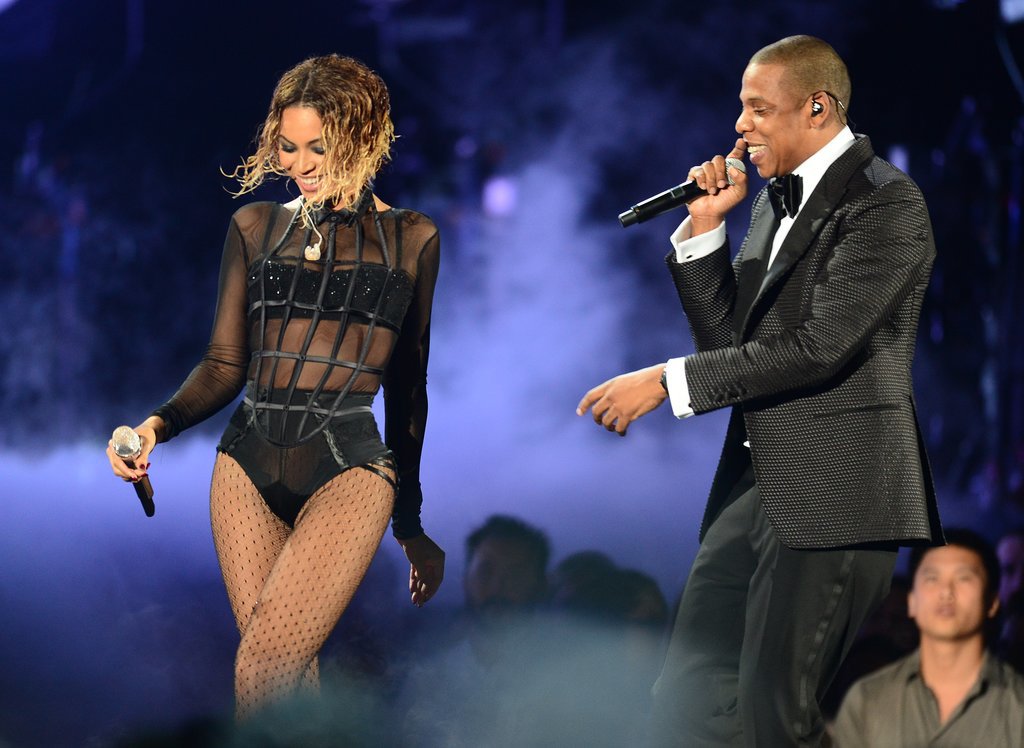

In a time in which pyrotechnics, seizure-inducing flashing lights (reference absolutely intended), elaborate costumes and entire troupes of backup dancers are valued in live musical performances, Beyonce decided that she needed nothing but a chair, a rotating platform and her husband to intoxicate everyone with her performance of “Drunk in Love” at the 2014 Grammy Awards on Sunday, Jan. 6th.
It shouldn’t be any surprise that her approach was simplistic, nay purist in nature — we are not talking about Katy Perry, after all. Beyoncé doesn’t need the same kind of help. She without a doubt knows by this point in her career that by virtue of the unprecedented culture that surrounds her persona, she can convey quite a bit to an audience with very little. And so she did; at the 56th annual Grammy Awards she took full advantage of her ability to basically do whatever she wants.
I can’t claim to fully understand the executive liberty they allow Bey in choosing what and how to perform, but this performance seems to reflect a significant personal touch on her part. Rocking a new cropped hairstyle that only Beyoncé could successfully pull off, plus a strappy bodysuit that left just enough to the imagination and a pair of Jennifer Fisher dagger earrings that cost roughly one-quarter of a year’s tuition at Amherst College, Beyoncé’s aggressively posed body stood in relief against a single spotlight as the show began.
She straddled the chair; she began to sing; people began to lose their minds; the very substance of the universe began to tremble. I must admit that I was a bit surprised when the chair began to rotate; I found the rotating platform unnecessary and even awkward at times when Beyoncé was prowling around on the floor and could not seem to reconcile the platform’s movements with her own. But around the platform rotated Beyoncé as she sang and seduced the crowd with her endless confidence.
At certain points in the performance, Beyoncé was bent over backwards entirely parallel to the floor, gyrating on and around the auspicious piece of furniture, moving in a way that any normal person would find difficult to do. Singing while moving like she does would not even be a reasonable consideration for most of us. But regardless, she managed to belt through every flawless, well-considered motion. The accuracy with which she replicated her recorded performance of her new hit was wonderful. As the performance continued, she alternated between standing up and dancing and sitting on the stage. She crawled around a bit, gracefully arose and then — who would have guessed — Jay-Z came swaggering out from behind the stage to fulfill his role as Beyoncé’s surfboard. I mean, perform his verse.
I don’t know if there was any conceivable way to successfully merge their respective stage presences. I actually laughed a bit as Jay began to rap and Beyoncé kind of just grabbed him by the hand and began leading him downstage. He was clearly not finished rapidly gesticulating, but Jay-Z made do with an awkward cross-body embrace with his wife as they came together to wrap the performance up. A sexually-suggestive brush of the hand, a shot of Taylor Swift getting down with her awkward self once again alluded to the provocative and a final (quite adorable!) hug ended the undoubted performance of the night.
I’m not going to elaborate on the anticipated criticism that she received for her provocative routine; it most definitely incited some sort of Twitter war between morally stalwart soccer moms and anybody between the ages of 16 and 25. Nothing new was added to the highly intellectual discourse of what is appropriate to be showing on live television. The criticism that she and Jay-Z collectively received for the infamous “Eat the cake, Anna Mae” line, however, deserves some attention.
A number of websites decided to publish opinion pieces in response to the couple’s choice to stick with the allusion to Tina Turner’s biopic “What’s Love Got to Do With It” and the domestic abuse that Turner endured by the hand of her husband, Ike Turner. Many websites criticized the duo for so casually referencing a documented case of domestic abuse within the sexually-charged context that “Drunk in Love” indisputably (gloriously) establishes. Others questioned whether the line should be a point of concern or not; some decided that it was not surprising, considering the climate of the music industry today and the frequency with which these potentially unsettling remarks appear with casual intentions. Nonetheless, the differing opinions did incite an interesting discourse on Beyoncé’s self-declared feminism and whether her behavior, such as the performance at the Grammys, works to substantiate or contradict this.
All things considered, I must say that I really enjoyed the performance. Also, surfboard.